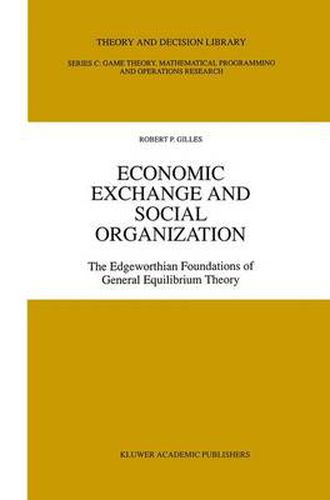Readings Newsletter
Become a Readings Member to make your shopping experience even easier.
Sign in or sign up for free!
You’re not far away from qualifying for FREE standard shipping within Australia
You’ve qualified for FREE standard shipping within Australia
The cart is loading…






This title is printed to order. This book may have been self-published. If so, we cannot guarantee the quality of the content. In the main most books will have gone through the editing process however some may not. We therefore suggest that you be aware of this before ordering this book. If in doubt check either the author or publisher’s details as we are unable to accept any returns unless they are faulty. Please contact us if you have any questions.
This book aims to develop an institutional approach to general economic equi librium. Thus far, institutional economics has essentially been confined to purely verbal discourse. Here I argue the case that general equilibrium theory forms a well rounded basis for the development of an institutional economic the ory. The fundamental economic trade mechanism underlying this refocusing is that of the Edgeworthian barter mechanism modelled through the equilibrium notion of the core of an economy. There is an extensive literature that links the core with the Walrasian price mechanism, which is explored in this book. Next I develop an alternative model of explicitly nonsovereign trade in the setting of an institutionally structured economy. In this book the core and several of its extensions are considered to be descriptions of the equilibrium allocations resulting from institutionalized barter processes, thereby providing a basis of an institutionally based economic theory. Traditionally finite economies have been assessed as the most natural represen tations of real life economies, in particular of market economies. Many funda mental insights have been developed. In the first half of the book I summarize the most influential and important results in the literature on finite economies regarding the relationship of the Walrasian model of a perfectly competitive market system and the Edgeworthian theory of individually based, pure barter processes. I use the axiomatic method as the main methodological framework according to which I construct my models.
$9.00 standard shipping within Australia
FREE standard shipping within Australia for orders over $100.00
Express & International shipping calculated at checkout
This title is printed to order. This book may have been self-published. If so, we cannot guarantee the quality of the content. In the main most books will have gone through the editing process however some may not. We therefore suggest that you be aware of this before ordering this book. If in doubt check either the author or publisher’s details as we are unable to accept any returns unless they are faulty. Please contact us if you have any questions.
This book aims to develop an institutional approach to general economic equi librium. Thus far, institutional economics has essentially been confined to purely verbal discourse. Here I argue the case that general equilibrium theory forms a well rounded basis for the development of an institutional economic the ory. The fundamental economic trade mechanism underlying this refocusing is that of the Edgeworthian barter mechanism modelled through the equilibrium notion of the core of an economy. There is an extensive literature that links the core with the Walrasian price mechanism, which is explored in this book. Next I develop an alternative model of explicitly nonsovereign trade in the setting of an institutionally structured economy. In this book the core and several of its extensions are considered to be descriptions of the equilibrium allocations resulting from institutionalized barter processes, thereby providing a basis of an institutionally based economic theory. Traditionally finite economies have been assessed as the most natural represen tations of real life economies, in particular of market economies. Many funda mental insights have been developed. In the first half of the book I summarize the most influential and important results in the literature on finite economies regarding the relationship of the Walrasian model of a perfectly competitive market system and the Edgeworthian theory of individually based, pure barter processes. I use the axiomatic method as the main methodological framework according to which I construct my models.